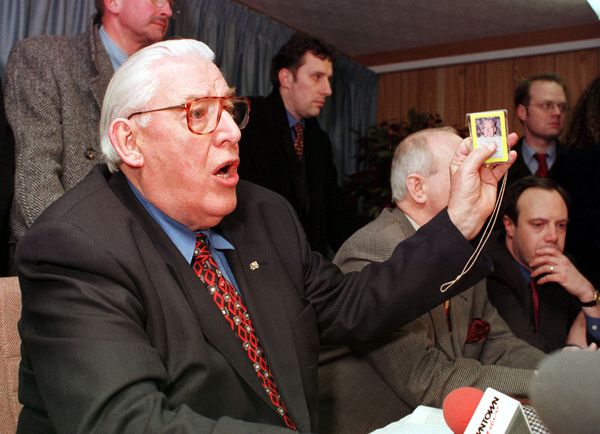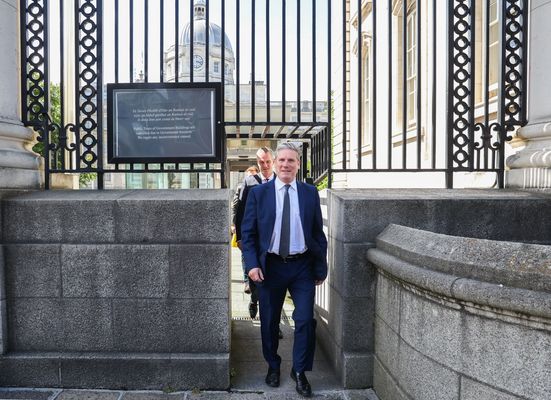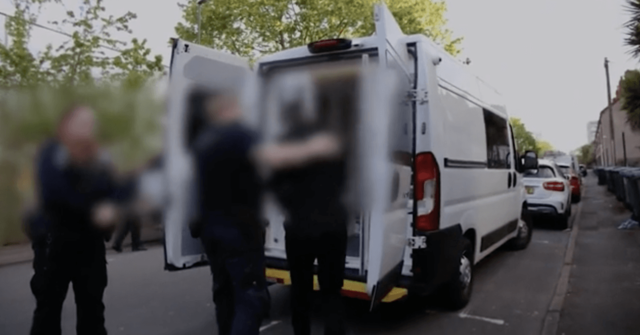Last week’s Hoey hoo-hah rumbles on. Baroness Hoey wrote the foreword in the latest pamphlet from the Unionist Voice Policy Studies (UVPS) group published last week. The pamphlet is less ‘policy studies’ and more an attempt to make a legal argument for how and why the implementation of the protocol must be prevented.
in the words of Professors Katy Hayward and David Phinnemore: “Consent in Northern Ireland is not a sacred principle but a legal requirement that is carefully limited to a border poll on Irish unification and key decisions in adopting devolved legislation.”
It doesn’t stop there as it makes the case that “the institutions should be brought down” unless or until “appropriate amendments are made to the Belfast Agreement to reflect the substance of the principle of consent”. Call it 'Habib mark II'. The argument of Habib was that the Act of Union 1800 took precedence over the protocol; the UVPS case is that the protocol should be subservient to the strand one provisions of the Northern Ireland Act 1998. So far the courts are unimpressed.
RALLYING CRY
You will not find the phrase “principle of consent” anywhere in the Good Friday Agreement. Yet this has become the rallying cry of opponents of the agreement and a few of its supporters from 1998. They claim the protocol has “trashed” the “carefully balanced relationships” of the agreement, an interesting take by the DUP and Donaldson himself who walked away from the agreement at the time.
Incidentally, another who went AWOL during the peace talks was Ian Paisley. In January 1998 he decided to head for the Cameroon for an eight-day preaching tour, along with the Rev David McIlveen, leader of Save Ulster from Sodomy. We know about this because accompanying the preachers was Jon Ronson who made a film about the tour for Channel 4 called 'Dr Paisley I Presume'. Paisley quickly discovered that Ronson was not only Welsh but also Jewish. Ronson recalls: on our first trip my walkie-talkie crackled into life. “Germany calling!” Dr Paisley hollered. “Germany calling! There’s a good degree of racism in us all! Did you hear that? Racism in us all! Ha ha! Over!”
During the trip Paisley developed three nicknames for Ronson: The Jew, My Jewish Friend, and My Circumcised Friend. Ronson explains how he “tangentially helped broker peace in Northern Ireland” during an appearance on Have I Got News For You:
Back to consent. The GFA is quite clear about consent. There will be no change to the North’s constitutional status without the consent of a majority as expressed in a border poll. This is explicitly respected by the protocol. It is what Professors John McGarry and Brendan O’Leary call the “consent-to-sovereignty principle”.
The second use of consent comes into the specific ‘cross-community’ arrangements for the Stormont Assembly as provided for in the Northern Ireland Act 1998. This is the notion of ‘parallel consent’ which applies to certain proceedings of the Assembly.
To summarise, in the words of Professors Katy Hayward and David Phinnemore: “Consent in Northern Ireland is not a sacred principle but a legal requirement that is carefully limited to a border poll on Irish unification and key decisions in adopting devolved legislation.”
LIMITED MEANINGS OF CONSENT
It is the limited meanings of consent in the GFA that are under attack when unionists and loyalists invoke their “principle of consent”. The UPVS pamphlet gives the game away when it argues that “there must be fundamental reform of the NI Act 1998, not least in relation to ensuring the principle of consent (…) protects the substance rather than merely the symbolism of the Union.” In other words, the unionist principle of consent doesn’t really exist right now so let’s get it written into the 1998 Act.
Most of Baroness Hoey’s foreword comments were on the above themes, including the question: “what shouldn’t unionists do given the manner by which the Belfast Agreement has been used against them…”. It was not her remarks on the protocol that attracted attention, however, but the following statement: “There are very justified concerns that many professional vocations have become dominated by those of a nationalist persuasion, and this positioning of activists is then used to exert influence on those in power.”
This is Baroness Hoey’s attempt to launch a culture war against the “positioning of activists”, or what she sees as a conspiracy by nationalists in academia, law, journalism, public service, and the BBC, led from the top by Gramsci fanboy President Higgins. Attack professions, attack “mainstream media”, attack universities, attack the judiciary, ignore evidence and manufacture your own “facts”: these became the staples of the Leave campaign in England and live on in anti-vaxxer ‘freedom’ movements (which have attacked vaccination centres), mask refuseniks and the likes of the Tory Party Covid Recovery Group faction of MPs currently breathing down prime minister Johnson’s party hungover neck. Hoey’s own respect for expertise and evidence is on display here:
My favourite Kate Hoey moment has to be her reply to the simple @afneil question "Can you name any reputable independent study that show us better off if we leave?". Textbook Farage @katehoeymp pic.twitter.com/OWNHJ91NRB
— Kris Griffiths (@KrisGriffiths) July 8, 2019
We are well used to culture wars. Some might say the whole history of the North has been one long culture war of contested identities, allegiances and cultures. Looking back, some examples seem laughable. There was the attempt to ensure that the RUC lived on, at least in outer space, when three retired officers paid $48 for the privilege of naming a star in the Hercules constellation after the force. Or there is the better known example of an episode of Star Trek from 1990 which, from the vantage point of the year 2366, debated “armed rebellion” and “terrorism” that had succeeded in uniting Ireland in the year 2024. The offending reference was edited out and the full episode has never been broadcast in Ireland.
The serious point about culture wars is they start from small beginnings but ripple out to wash up on many shores. Jon Ronson has just completed a brilliant series of podcasts on culture wars in the US called Things Fell Apart. Ronson defines a culture war as “a battle for dominance over conflicting values”. His culture war origin stories include the banning of school books, the trans debate, racism, abortion – “one of America’s most violent culture wars” – homophobia, online shaming and bullying, but somehow they all end up with Trump who, in case you hadn’t noticed, has not gone away.
STORMING OF THE CAPITOL
Marking one year on from the storming of the Capitol by assorted Trump supporters, President Biden said last week that Trump and those he incited had “held a dagger at the throat of America and American democracy”. He sternly warned that “we’re engaged anew in a struggle between democracy and autocracy, between the aspirations of the many and the greed of the few, between the people's right of self-determination and self-seeking autocrat[s].”
And that struggle is the “coming storm”. Trump’s big lie is that the 2020 election was stolen (by a bunch of satanic paedophiles). Political unionism’s big lie is that the protocol violates the “principle of consent” (blame the satanic EU). In both cases there are significant numbers of activists who believe they have reason to collapse governance arrangements and incite or participate in violence. In the US, 20 million think violence is justified to put Trump back in office and there is even talk of a new civil war.
Mercifully, very few in the North so far seem to think that getting rid of the protocol and legislating for a unionist “principle of consent” are worth rioting over. But this won’t necessarily hold back the DUP from more pre-election stunts over the GFA institutions. In any event, Liz Truss – note that the North’s current critical issue is now being handled by the Foreign Secretary – is unlikely to be impressed, as her eye is on the Tory leadership.
Read my piece in @telegraph on the importance of safeguarding peace in Northern Ireland ahead of my 1st meeting with @MarosSefcovic at Chevening this week👇https://t.co/72JNy6KOyJ
— Liz Truss (@trussliz) January 8, 2022
Truss is on the board of the 'think tank' 1828 whose main purpose is to promote free markets and limited government, a natural extension of her Britannia Unchained foray. Let’s hope she takes note of a blog on 1828’s website that states: “Considering that EU rules apply in NI under the Protocol, it is unreasonable to expect Brussels to allow the ECJ to no longer play a role.” That would be a good place to start in bringing discussions with the EU to a rapid pragmatic conclusion.









